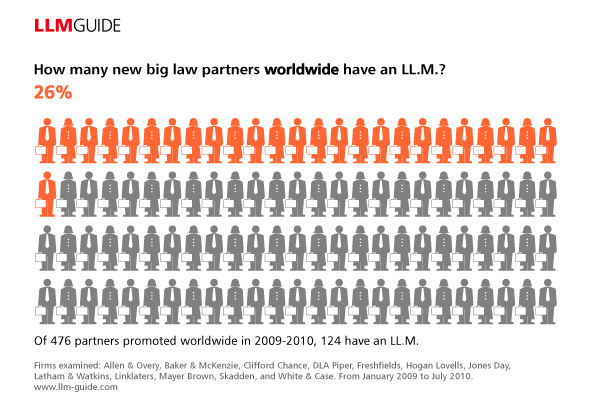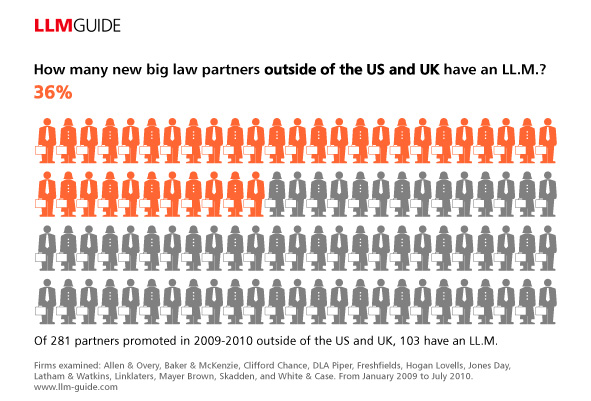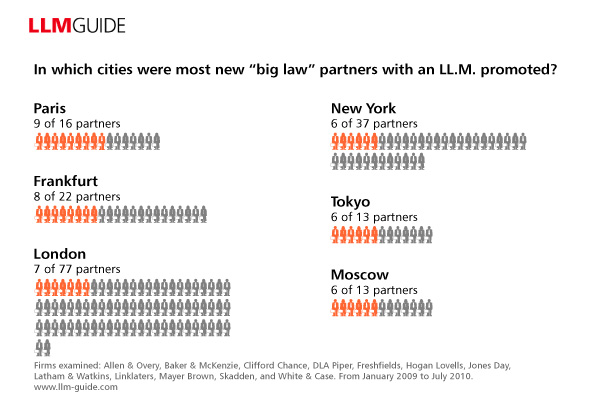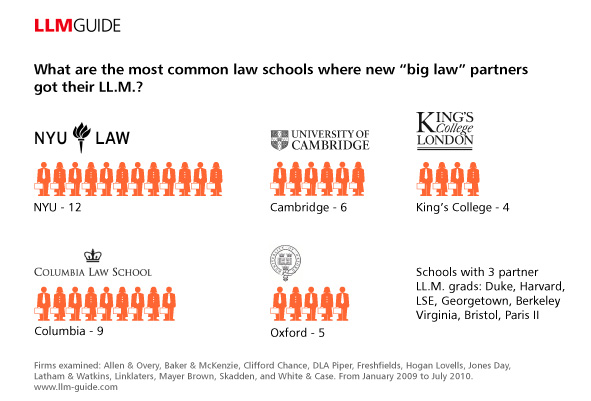
(Note: in 2015 we surveyed over 20,000 profiles of associates, partners, counsels, and consultants to get a better sense of the value of the LL.M. in Big Law.Learn more here)
"If you want to do an LLM, then do so, but the degree gives you no advantage in securing an offer from us," reads an FAQ on the Freshfields Bruckhaus Deringer Global Careers website.
Ouch. Not exactly encouraging words for a lawyer thinking about dropping everything to go get an LL.M. Sure, it's widely accepted that an LL.M. alone cannot make or break a legal career. But to say that it's a non-factor might sound a little extreme.
This question about the value of an LL.M. has been taken up by the National Law Journal in a recent article, "'Cash cow' or valuable credential?" It describes the growing number of LL.M. programs at law schools, and the lingering uncertainty about whether these programs pay off for lawyers who have graduated from them.
The value of an LL.M. seems to rest largely on a lawyer's background and where they want to work. In Germany, for example, Freshfields actively recruits lawyers with an LL.M. The firm offers LL.M. scholarships for German law school graduates, and attends recruitment events, such as the annual New York LL.M. job fairs.
"We are interested in those who have studied in the US, the UK, Australia, South Africa, and New Zealand," says Hedi Ruth Osenberg, human resources manager at Freshfields in Hamburg. About 30 percent of new hires at Freshfields in Germany last year had an LL.M. from one of these English-speaking countries.
"The main things are English-language skills and the intercultural experience," says Osenberg about how an LL.M. can strengthen a candidate's profile. The year studying abroad makes lawyers more aware of differences and difficulties among nationalities - something Osenberg says is "very helpful" at a firm working on transnational deals and international clients on a daily basis.
Freshfields' recruitment statistics in Germany are echoed if one looks at “Big Law” partner promotions globally. Of 474 partners promoted between January 2009 to July 2010 at 12 of the world's biggest international law firms, about a quarter of them had an LL.M.*
Freshfields, for example, promoted 32 new partners in 2009-10, 8 of whom had an LL.M. All 8 were promoted at offices outside of Britain and the United States. This reflects another trend at the 12 firms: of 281 partners promoted outside of the UK and US, a bigger percentage - 36%, or 103 partners - had an LL.M.
But we all know that partner promotions are based on performance; not education. So what - if anything – do these numbers suggest? That the LL.M is valued more abroad? That most lawyers seem to get along just fine without one?
Perhaps both. For US- and UK-trained lawyers looking to work in Big Law, an LL.M. is often seen as irrelevant. One US hiring partner at Jones Day told the National Law Journal that a Tax LL.M. is the "only LL.M. degree that has much of an impact on our hiring decisions."
Even beyond tax, some US and UK lawyers take an LL.M. to formally deepen or acquire a new specialization, such as in Maritime Law or Entertainment Law, when they have developed a new interest, or when their first law school might not have offered a focus.
For lawyers trained outside of the US or UK, specialization is just one of a handful of reasons to pursue an LL.M.; the others include proving English skills, qualifying for the bar, adding another - perhaps better - law school to their resume.
According to Loukas Mistelis, law professor at Queen Mary, University of London, a little "creative thinking" when picking LL.M. courses or specializations can help lawyers stand out when it comes time to find a job.
"Whether someone has specialized or not, that's also an indication of whether a particular individual is somebody who can work in a competitive environment like a law firm," says Mistelis.
"That's where most LL.M. students make a mistake," says Mistelis. "If a topic is popular, they will all take it, without realizing that they will not have a competitive edge. During the financial crisis, for example, banking and finance were very popular. Are there 500 banking law jobs in London? Certainly not."
Clearly, for foreign lawyers looking to work in the United States or Britain, the situation is more complicated, particularly in difficult economic times. Many law firms that recruit LL.M. students do so with an eye on placing them at overseas offices – often back in the lawyer's home country, where the firms can benefit from his or her language skills and mix of international and local knowledge.
But it's not unheard of for some foreign lawyers to land jobs in the US or UK after the LL.M. Argentinian lawyer Fernando Gutierrez got hired at a Miami firm shortly after finishing the Comparative Law LL.M. at the University of Florida earlier this year. He calls the LL.M. a “decisive factor” that helped him get the job.
"I think that the LL.M. did definitely open me a lot of doors that otherwise would have been closed," says Gutierrez.
"Having an LL.M. does not only show good academic position, but also some other personal and professional characteristics that every law firm is always looking for,” he says. “These are perseverance, tenacity, maturity, and a desire to grow. All of those aspects will certainly help the law firm to grow and generate more clients."
"Moreover, having an LL.M. and due to the fact that you are a foreign lawyer, the law firms know that they are getting not only an important and very valuable human resource force, but also many more potential contacts with different jurisdictions that can always open new business that before were totally unknown."
The discussion over the value of an LL.M. is bound to continue. More hard data about return on investment from these programs have been called for. And yes, quality does vary from program to program, so buyer beware. But blanket statements about the LL.M. degree as "worthless" lazily ignore the reasons so many lawyers are interested in these degrees.
Does the LL.M. make sense for every lawyer? Probably not. Quality programs, however, should continue to appeal to lawyers looking to sharpen their profile with a formal specialization, proven English skills and international experience, and possibly a successful stab at a US bar exam (if you're a foreign lawyer) - things that would certainly make a strong resume stronger.
On the other hand, lawyers expecting the doors of Big Law firms to fling open upon graduation from an LL.M. will probably be disappointed. But who expects that these days, anyway? After all, shouldn't lawyers be a skeptical bunch?
* - Firms examined: Allen & Overy, Baker & McKenzie, Clifford Chance, DLA Piper, Freshfields, Hogan Lovells, Jones Day, Latham & Watkins, Linklaters, Mayer Brown, Skadden, and White & Case. These were chosen for their size and proportion of global offices and promotions. These figures come primarily from the information provided on law firm websites. Some law firms inconsistently display the educational background of their partners. When no educational background could be found on the law firm website or via a cursory search elsewhere on the web, we assumed the partner does NOT have an LL.M. This means that the stated number of partners with an LL.M. is likely a minimum.
Image: "HK Alexandra House Lobby" by WiNG / CC BY 3.0 (cropped, rotated)














